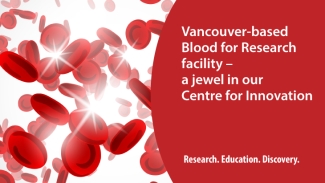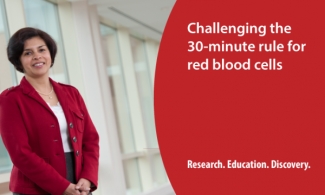It’s still in you to give: donating blood for research in Vancouver
Wednesday, October 19, 2016 Amanda Maxwell
“It’s in you to give" is the fantastically simple call to action from Canadian Blood Services. But for some people — such as those of us with a mixed bag of travel and medical histories — it isn’t so easy to just show up, roll up (a sleeve) and then settle back as this life-giving liquid flows into the collection bag.
Blood collected through regular donations goes to patients who need blood products to manage a wide variety of health concerns. Recipients are already dealing with serious medical issues, and the last thing they need is added risk from a transfusion. For this reason, Canadian Blood Services is hyper-vigilant about protecting recipients by ensuring the high quality of its products.
The safety of the blood supply managed partly by screening, whereby donations are delayed or prevented due to a variety of risk factors. These include recent travel to active hot spots for infections such as malaria and Zika virus, potential exposure to pathogens, and existing medical conditions such as cancer. Find out if you’re able to donate by taking this short quiz.
For many prospective donors, this screening can mean a lifetime ban on donating blood. But for some, there is another way to help. If you live in or around Vancouver, it is still possible to roll up a sleeve, but this time for research. Your blood can make a difference!
It’s still in you to give
There is no suitable biological substitute for the red stuff. So how do Canadian Blood Services and clinical researchers test out new equipment and processing workflows or investigate transfusion science?
This is where Canadian Blood Services' Blood for Research donor clinic in Vancouver comes in. It’s set up just like a regular donation clinic, but it accepts blood from some people who are not eligible through the regular donation program. This is a truly unique facility established by Canadian Blood Services in 2002. Here they collect and process donations to support the design, development and validation of new products and processes. They also distribute products for research to scientists and other specialists who need blood for discovery research.
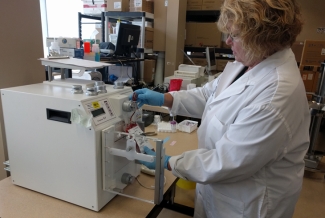
We runs a fully equipped laboratory and processing facility on site. This is also where equipment is tested, using blood donated in the onsite clinic.
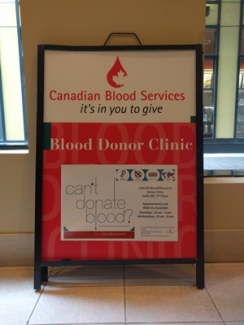
How do I get started?
First, check out the eligibility requirements for regular donation. These change frequently as Canadian Blood Services gets new information from transfusion science. If you find that, like me, a cancer survivor [Note that not all cancers result in a lifetime donation ban!] and a former resident of the United Kingdom, you are indeed ineligible for regular donation, then head over to check your blood for research eligibility.
From here, making an appointment is easy. Although it’s possible to drop in, the blood for research clinic is often fully booked, so it’s best to either email or phone to set up a date and time. The clinic will send you a reminder a week before, with information on location, parking and how to prepare yourself for giving blood: with a good night’s sleep, and by staying hydrated and eating a suitable meal.
A welcome sign at the door. The blood for research clinic is easy to find, and directions are included in the welcome email you’ll receive before your appointment.
On the day
Just like in regular blood collection clinics, the blood for research clinic is proactive about donor safety. In addition to standard testing (hemoglobin levels, blood pressure and body temperature) on the day of donation, all donors must complete a standard health questionnaire that flags potential areas of concern. If clinic staff cannot ensure that there is no risk to you, they will delay collection until a medical advisor has cleared you.
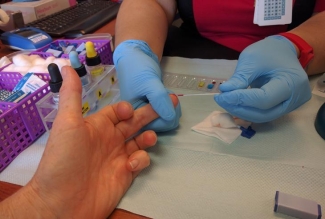
A tiny blood sample by finger prick is taken to check for hemoglobin levels before donation. Many donors say the finger prick test at the beginning of the appointment is the most painful part of the whole procedure. It is — the rest is easy!
In addition to health screening, 'blood for research' donors have an extra step to confirm consent. Before donating, you will be asked for consent to use and bank your blood for current and future research projects, and you may even opt out of specific research areas, if you so wish.
Then all you need to do is settle back on the couch and let staff expertly guide you through the donation process. You won’t find any differences in procedure from this point onward, since staff use the same blood collection tubing and bags as in the regular donation clinics.
![Nothing unusual is going on here: You’ll find all the same bags, tubes and monitoring equipment used in a regular donation clinic. [Blood donation in progress, with blood flowing through the tube from patient to blood bag.] Nothing unusual is going on here: You’ll find all the same bags, tubes and monitoring equipment used in a regular donation clinic. [Blood donation in progress, with blood flowing through the tube from patient to blood bag.]](/sites/default/files/styles/max_325x325/public/netCAD3.jpg.jpeg?itok=1S8gvT6K)
Blood donation in progress, with blood flowing through the tube from patient to blood bag.
Nothing unusual is going on here: You’ll find all the same bags, tubes and monitoring equipment used in a regular donation clinic.
Collection takes around 15 minutes. Once it’s over, expect to stay on site for 10 to 15 minutes relaxing over a coffee, hot chocolate or juice, and cookies. Did I mention that parking and transit costs are covered too?
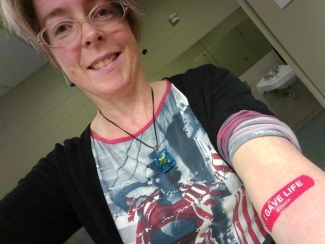
It’s still in ME to give! Whoopee! A blood donor once again, with a snazzy bandage to prove it.
Want to come back? As with regular donations, you must wait a minimum of 56 days (or longer) between visits.
Blood for Research clinic location and details:
University Marketplace (at UBC)
207-2150 Western Parkway
Vancouver, BC V6T 1V6
researchdonations@blood.ca
(604) 221-5515
Canadian Blood Services – Driving world-class innovation
Through discovery, development and applied research, Canadian Blood Services drives world-class innovation in blood transfusion, cellular therapy and transplantation—bringing clarity and insight to an increasingly complex healthcare future. Our dedicated research team and extended network of partners engage in exploratory and applied research to create new knowledge, inform and enhance best practices, contribute to the development of new services and technologies, and build capacity through training and collaboration.
The opinions reflected in this post are those of the author(s) and do not necessarily reflect the opinions of Canadian Blood Services.
Related blog posts
Located in Vancouver, BC, near the University of British Columbia campus, our blood for research facility comprises a whole blood and apheresis donor clinic as well as a research and production laboratory.
Led by Dr. Sandra Ramirez, a development scientist at Canadian Blood Services’ Centre for Innovation, this research project led to a new standard that will reduce the number of discarded red blood cell units. By Jenny Ryan and Patrick Walton The issue Since the 1970s, blood operators have limited...
